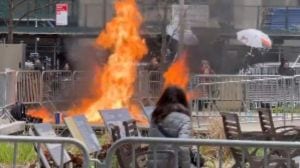- India
- International
Unlocking justice
That a 19-year-old is still in jail, accused of sedition, because court sees no urgency in her matter is a tragedy and travesty.
 The courts are the time-tested recourse for upholding and safeguarding constitutional protections for the citizens’ freedom of expression, including and especially the liberty to dissent.
The courts are the time-tested recourse for upholding and safeguarding constitutional protections for the citizens’ freedom of expression, including and especially the liberty to dissent.
Individuals against whom cases of sedition have been filed in recent months, for protests against the Citizenship Amendment Act and the proposed National Register of Citizens in particular, may be facing a double injustice, in the justice process. As a report in this paper has brought to light, amid a public health emergency in which courts are hearing only “urgent” cases through video-conferencing, bail pleas filed in these cases are not being defined as such. That these people, like 19-year-old Amulya Leona, arrested in February by Bengaluru police under Section 124 of the IPC for raising “Pakistan Zindabad” slogans at an anti-CAA rally, are languishing in custody, their bail pleas unheard, is the second injustice. The first, as another report in this paper underlined in February, predates the pandemic: It is the fact that in many of these arrests, the remand orders by magistrates neither asked nor answered basic questions laid down by the Supreme Court to satisfy themselves that the serious sedition charge is founded. A scrutiny of 25-odd arrests made on charges of sedition in UP, Karnataka and Assam since the anti-CAA protests began, threw up a sobering pattern of police custody granted by courts, no questions asked, no reasons given, or after the most perfunctory hearings. While the Supreme Court has upheld the colonial-era sedition law, it has also read the provision restrictively, saying only seditious “speech tended to incite public disorder” was punishable. The apex court has emphasised that clear and immediate incitement to violence is necessary for making the offence of sedition.
The apparent languor of the courts, the evident lack of rigour or urgency, in cases where it would appear that the government is criminalising acts of protest by slapping serious charges on them, is troubling. It is disquieting if the pandemic becomes a cover to delay or deny the weak and the vulnerable their day in court, their fundamental right to bail. Ever since people’s protests began across the country against the CAA and the proposed NRC — they were seen to be introducing religion as a criterion for citizenship, and discriminating against the Muslim minority — the BJP-led government at the Centre has, deservedly, invited accusations of intolerance of views different from its own. The government did not just turn a deaf ear to the protesters, it also attempted to subdue them, including by wielding the sedition law. This has cast a greater responsibility on the court.
The courts are the time-tested recourse for upholding and safeguarding constitutional protections for the citizens’ freedom of expression, including and especially the liberty to dissent. They must not show, nor be seen to show, a lack of alacrity in performing their vital role.
EXPRESS OPINION
More Explained
Apr 19: Latest News
- 01
- 02
- 03
- 04
- 05
































